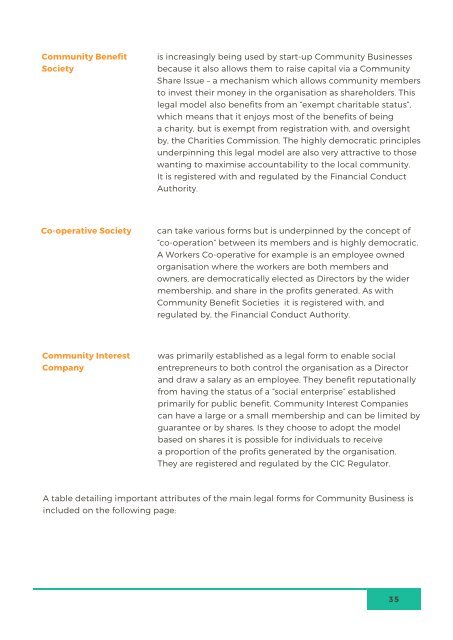Cultivating Diversity – BME Community Enterprise Toolkit
Create successful ePaper yourself
Turn your PDF publications into a flip-book with our unique Google optimized e-Paper software.
<strong>Community</strong> Benefit<br />
is increasingly being used by start-up <strong>Community</strong> Businesses<br />
Society<br />
because it also allows them to raise capital via a <strong>Community</strong><br />
Share Issue <strong>–</strong> a mechanism which allows community members<br />
to invest their money in the organisation as shareholders. This<br />
legal model also benefits from an “exempt charitable status”,<br />
which means that it enjoys most of the benefits of being<br />
a charity, but is exempt from registration with, and oversight<br />
by, the Charities Commission. The highly democratic principles<br />
underpinning this legal model are also very attractive to those<br />
wanting to maximise accountability to the local community.<br />
It is registered with and regulated by the Financial Conduct<br />
Authority.<br />
can take various forms but is underpinned by the concept of<br />
Co-operative Society<br />
“co-operation” between its members and is highly democratic.<br />
A Workers Co-operative for example is an employee owned<br />
organisation where the workers are both members and<br />
owners, are democratically elected as Directors by the wider<br />
membership, and share in the profits generated. As with<br />
<strong>Community</strong> Benefit Societies it is registered with, and<br />
regulated by, the Financial Conduct Authority.<br />
was primarily established as a legal form to enable social<br />
<strong>Community</strong> Interest<br />
Company<br />
entrepreneurs to both control the organisation as a Director<br />
and draw a salary as an employee. They benefit reputationally<br />
from having the status of a “social enterprise” established<br />
primarily for public benefit. <strong>Community</strong> Interest Companies<br />
can have a large or a small membership and can be limited by<br />
guarantee or by shares. Is they choose to adopt the model<br />
based on shares it is possible for individuals to receive<br />
a proportion of the profits generated by the organisation.<br />
They are registered and regulated by the CIC Regulator.<br />
A table detailing important attributes of the main legal forms for <strong>Community</strong> Business is<br />
included on the following page:<br />
3 5


